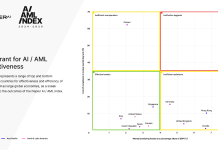In today’s dynamic business environment, organisations are facing ever-increasing compliance regulations. As a result, business-wide anti-money laundering (AML) and counter-terrorism financing (CTF) risk assessments are becoming critical for all businesses, regardless of their size, industry or location.
The growing prevalence of financial crimes such as money laundering, bribery, corruption, fraud, and tax evasion has triggered a heightened response from global financial crime regulators. As Arctic Intelligence Founder and CEO Anthony Quinn points out, regulatory authorities like the Financial Conduct Authority (FCA) in the UK are increasingly focussing on scrutinising control effectiveness by setting expectations for businesses.
Anthony Quinn warns that the rapidly evolving landscape of threats, laws, and regulatory expectations can be chall1enging to navigate for many businesses. However, the core approach to meeting compliance obligations and protecting against criminal exploitation remains crucial. Implementing robust AML/CTF measures after conducting extensive business-wide money laundering risk assessments, he suggests, is an effective way to demonstrate commitment to compliance and bolster defence mechanisms against illicit activities.
Financial crimes such as money laundering pose a severe risk to a business’s reputation, directly affecting customer trust and potentially impacting the bottom line. A robust AML/CTF compliance program can, however, help mitigate these risks, reinforcing operational integrity and reassuring customers about the organisation’s ability to combat financial crimes and minimise risk exposure.
Organisations that invest in financial crime risk management not only protect their organisations but also enhance their reputations. Anthony suggests that negative publicity following significant breaches and penalties can severely damage reputations and existing customer relationships, with prospective customers able to quickly uncover past management and administrative failures online. This reputational damage can lead to long-term commercial implications.
Maintaining financial stability is another crucial aspect. Illicit activities harm businesses and communities, distort legitimate economic activity, and pose substantial risks to local, national, and international financial systems. Nonetheless, effective implementation of AML/CTF controls can help mitigate these adverse effects and promote market stability.
Anthony strongly advocates for organisations adopting a technology-enabled, human-led approach to identify vulnerabilities according to global regulations and the Financial Action Task Force (FATF) guidelines. This approach, he believes, is integral to protecting businesses from financial crimes and contributes to financial stability in their operational markets.
Failure to comply with AML regulations can lead to severe penalties, fines, and legal trouble. Proactively implementing risk assessment and AML practices can minimise the risk of such consequences. Anthony further recommends automated systems and data analytics as valuable tools for identifying suspicious activities, given the time-sensitive and data-intensive nature of financial investigations.
The implementation of risk assessment and AML practices can significantly enhance operational efficiency. By utilising the right solutions, businesses can effectively address challenges, identify areas of high risk, and efficiently manage gaps or weaknesses. Shifting from manual, time-consuming processes to dynamic and automated real-time assessments can streamline workflows, minimise disruptions, and allocate resources more effectively.
For businesses operating globally, understanding and complying with the regulations of each country helps avoid potential reputational risks and legal issues. Anthony explains that over 200 countries have adopted AML regulations aligning with international standards set by the FATF. This global alignment has established an effective system to combat money laundering and terrorist financing.
The power of regulatory technology (RegTech) cannot be underestimated in this context. Anthony insists that the available technology today allows businesses to manage risks effectively, avoiding unnecessary vulnerabilities and enabling them to respond quickly to changes in organisations, regulators, and laws.
Arctic Intelligence, a recognised expert in RegTech, offers two award-winning financial crime risk assessment platforms: the AML Accelerate Platform for small and medium-sized businesses, and the Risk Assessment Platform, tailored for larger enterprises.
Read the full post here.
Keep up with all the latest FinTech news here
Copyright © 2023 FinTech Global











